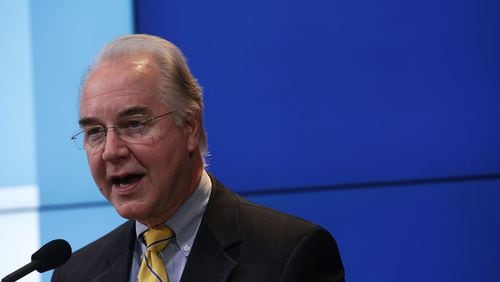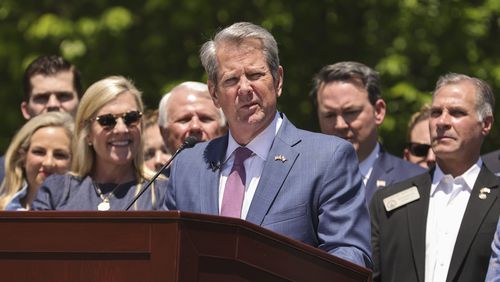More than six weeks of preparation have built up to this for Georgia U.S. Rep. Tom Price, who on Wednesday faces the din of Senate lights for the first of two confirmation hearings.
Democrats have indicated they won’t leave any thread untugged regarding the Roswell Republican’s nomination for health and human services secretary.
They particularly plan to drill in on his buying and selling of health-related stock. Senate Minority Leader Chuck Schumer, D-N.Y., on Tuesday spelled out in his most explicit terms yet that Price may have broken the law with at least one of those trades.
Republican leaders are livid. They think Price is unquestionably qualified and want to see him confirmed as quickly as possible.
“Total B.S.” is how Senate Finance Chairman Orrin Hatch, R-Utah, described Democrats’ most recent round of attacks.
“Everybody here knows he’s an honest guy. He’s disclosed everything. What more can he do?” Hatch said. “I’m just ashamed of the way my colleagues on the other side are treating him.”
Few understand the challenges Price faces better than the officials who once sat in that same position.
In recent interviews with The Atlanta Journal-Constitution, former health chiefs Louis W. Sullivan and Kathleen Sebelius described the process of being vetted and confirmed as secretary of health and human services as surreal, exhausting and often overwhelming.
“It was like drinking from a fire hose,” said Sullivan, the founding dean of the Morehouse School of Medicine who was President George H.W. Bush’s first health secretary beginning in 1989. “The volume of information you’re really expected to master was really quite expansive. That was quite a challenge.”
Their experiences offer a window into what Price, who has kept a low profile since President-elect Donald Trump selected him for the Cabinet position shortly after Thanksgiving, is going through as he makes his case to members of the U.S. Senate.
Study scramble
Sullivan and Sebelius said that by the time they sat at their first confirmation hearings, the lion’s share of the work had been done behind the scenes.
Mock hearings, private meetings with senators and mountains of briefing materials had prepared them for virtually every tough question that could have been shot their way. And before they were even officially nominated for the Cabinet-level position, nearly every detail of their personal, professional and financial lives had been picked over by the transition team.
“I’d run eight times for office. I’d been through vetting with the president for other things,” said Sebelius, who was governor of Kansas when President Barack Obama tapped her to lead the Department of Health and Human Services in 2009, “but nothing I would say quite like this.”
From there, the cramming began.
Sullivan recounts being handed two massive three-ring binders with briefs on HHS’ massive, roughly $1 trillion portfolio — which includes everything from Medicare and Social Security to public health and cosmetic testing — that he was to master before his confirmation hearings. And that didn’t take into account the dozens of pet issues of the senators whom he later met with in private.
“You can be asked anything by anybody at any time,” Sebelius said. “And while certainly as a nominee you’re not expected to have in-depth knowledge, you are expected to have knowledge of the program and general subject matter and some familiarity with what people are talking about. That’s a pretty extraordinary amount of information.”
Many nominees still have day jobs when they’re tapped for Cabinet positions. Sebelius said she was constantly flying between Washington and Topeka as she rounded up her work as governor. In Price’s case, he continues to serve as Georgia’s 6th District congressman, although he hasn’t taken a vote on the House floor in weeks.
Part of the behind-the-scenes work includes mock confirmation hearings known as “murder boards.” A room is staged to look like a Senate hearing room, with a dais and a table at the center, and transition team aides and occasionally former senators pummel the nominee with any and all questions that could be slung their way from senators.
The goal is to have nominees well-prepared enough that nothing comes as a surprise when they’re facing the real senators.
For Price, Democrats have indicated they plan to focus little on his qualifications for the job. In addition to his stock trades, they’re instead expected to zero in on his past plans to overhaul Obamacare and entitlement programs and what they see as dangers those could create for women and seniors in particular.
Confirmation
Throughout the process, a cone of silence is expected.
“That’s been protocol for a very long time,” Sebelius said. “The moment your nomination goes forward, the goal is do not create news. Nothing should be about you. It should all be about the incoming president.”
That largely worked for Sullivan, whose biggest slip-up came after he talked to an AJC reporter about abortion, presenting a stance that didn’t gel with Bush’s. He was later confirmed by the Senate 98-1.
Sebelius’ path to confirmation was rockier.
Republicans ultimately delayed the final vote on her nomination due to her past support for abortion rights and vision for health care as Obama’s team was in the early stage of fashioning what would become the Affordable Care Act.
She was ultimately confirmed 65-31. Price is expected to be confirmed on even more partisan lines.
That’s a shame, Sullivan said.
The country’s elected officials “have been voted on by our citizens to really go to Washington to solve problems, to make people’s lives better,” he said. “In my view I think some of that has been lost. There seems to be much more desire to prevent someone from the opposite party from achieving something. I think that’s unfortunate.”
HHS’ third doctor?
Price, if he is confirmed by the Senate, would be the third doctor to lead HHS. Sullivan, an Atlanta resident, was the last doctor to hold the job.
Sullivan said the job is much more difficult than when he was secretary, in part, because the incoming secretary will be tasked with carrying out Trump’s plan to dismantle and replace Obamacare.
“I think (Price) is going to have a tough time in that because he’s heading the department now that has as its major goal the repealing of the ACA,” Sullivan said. “The question that is obvious is how are they going to do this without causing a lot of damage, either by people losing insurance or putting the insurance market into a very volatile, unstable situation in terms of pricing their products? So I think it will be very difficult.”
Sullivan, who supports Obamacare but acknowledges there are issues that need to be changed, said Price’s background as a doctor could be an asset. But it also comes with an extra responsibility linked to their profession’s guiding Hippocratic Oath and its underlying principle: “Do no harm.”
“I’d like to see a physician heading the department doing everything to improve the health of Americans,” Sullivan said.
“So he has that challenge as a health professional to be sure he is true to the tenets of his profession.”
Sullivan said the secretary’s position offers a great platform to have a positive impact on health issues in the country. Sometimes it comes with controversy. When he spoke out forcefully in 1990 against cigarette smoking and the tobacco industry’s marketing tactics, the industry exerted pressure on the White House to put a muzzle on him. He wasn’t sure whether he would lose his job, but he felt strongly about the issue.
“I wasn’t fired,” he said. “And some weeks later the president made a comment commending me for my interest in health.”
Sullivan, who sent Price a congratulatory note after his nomination in November, said he has known the Roswell Republican since the early days of his political career and from his involvement in medical groups in Georgia. He said he’s hopeful Price will find a balance between his medical training and the partisan push to repeal Obamacare in the new Republican-controlled capital.
“I think Tom is very bright, and he and his colleagues may come up with strategies for making changes to the ACA or replacements for part of it in a way that people do receive coverage and care and we do bring costs down,” Sullivan said. “And I’ll be the first to cheer him on that.”










